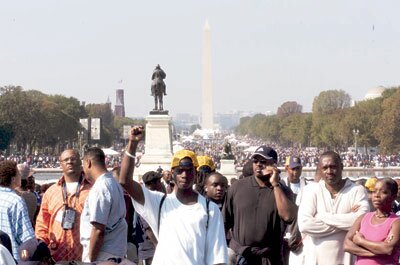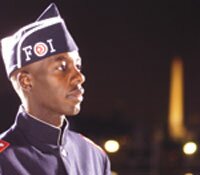 |
 |
 |
|
|
||||||||||||||
|
|
||||||||||||||
| Email Article | Printable Page |
"Millions" Marchers Rallied to Seek Truth
 |
|
Photo credit: Maya Gilliam/The Hilltop
The Millions More Movement rally featured a cross-section of generations.
|
Age and feebleness didn't deter 90-year-old Robert Shakir from attending the first historic march of the new millennium.
Shakir, who attended the March on Washington in 1963 and the Million Man March in 1995, was first in line to board the bus heading from Detroit to Washington.
"If you know your history, you know that you have a duty to attend," said Shakir, sitting beneath the shade of a tree. "We must be united. We must present the truth so even a fool will understand."
Shakir joined thousands of others as they sought to find the truth at the Millions More Movement rally.
Organizers sought to create a platform to discuss some of the major issues facing the African American community. Speakers berated the federal government for its lack of aid during Hurricane Katrina.
"Katrina showed us the neglect of the government," Minister Louis Farrakhan said. "Four hurricanes . . . hit Florida and there was no neglect. Five days the government did not act. I believe that if the people on the rooftops had blond hair and blue eyes, something would have been done."
While Katrina was one of the main issues discussed at the event, civil rights activist Jesse Jackson spoke about the need to fight for voting rights.
"It's hard to fight for voting rights [in] South Africa and deny it in South Carolina," Jackson said. "We can end this by changing our mind our behavior."
 |
|
Photo credit: Maya Gilliam Members of the Nation of Islam's Fruit of Islam provided security.
The Hilltop |
The event featured a cross-section of generations, with youth and elderly playing significant roles.
"There has never been a revolution started without young people in front of it," said Detroit Mayor Kwame Kilpatrick.
Flying from the University of Florida to participate, Latrice Hankerson said that she was disappointed in the apparent generational gap at the rally.
"They won't even allow young people a chance to talk," Hankerson said as she listened to youth leaders beg for time on the stage. "There is nothing here that bridges the generation gap."
The rally brought together organizations from across the country. Jacqueline Wells, a member of PEACE, an organization that seeks to help families who have lost loved ones to homicide, said the event was important because it brought harmony to the community.
"We need unity," said Wells, adding that she traveled more than eight hours from Buffalo, N.Y., to attend. "One of the reasons why our young men are killing each other is because they don't respect each other. We have to unify our community."
Sitting in a lawn chair and holding a picture of her murdered son, Wells said she had felt like crying during the speeches.
"I love to see our people come together," Wells said. "This is what we need. We need to bring back the old-time religion."
Hundreds of thousands of people used the Metro subway system to ride to the march, with many more coming by bus, organizers said.
"They tried to kill us, but by God's grace and Allah we are still here," one speaker, Jamail Muhammed, said to the crowd.
Looking out among people sitting on the grass listening to the speakers, Bill Grace, one of the organizers of the Million Man March, said the Millions More Movement was more far-reaching.
"We have women and children here to get a better outlook on the issues," Grace said. "We can cover more issues and take it back to our communities."
More than 2,000 students from Howard University awoke early and marched from the campus at 6 a.m. to make it to the Capitol for the rally.
"As we marched from Sixth Street, people from the community came up and joined us," Byron Stewart, president of the Howard student government association, said. "We brought about an additional 500 community members with us."
Almost every campus organization was represented in the Howard contingent, along with administrators, Stewart said.
"We came together, got up early and came strong," said Mckenzie Morris, sophomore legal communications major. " I think that Howard is about to do big things with our community and learn what our ancestors learned as well as what people in the past have taught us."
Posted Oct. 18, 2005
In News
Students Winning Court Judgments After Failed Vacation
Return of Stolen Statues Could Signal Others Will Follow
Marching 100 Have Phone Books Covered
| Home | News | Sports | Culture | Voices | Images | Projects | About Us Copyright © 2007 Black College Wire. Black College Wire is a project of the Black College Communication Association and has partnerships with The National Association of Black Journalists and the Robert C. Maynard Institute for Journalism Education. |